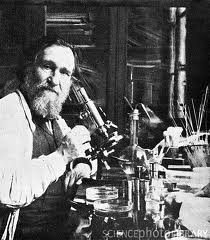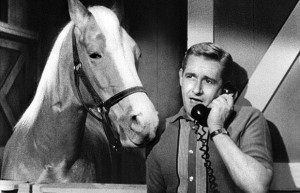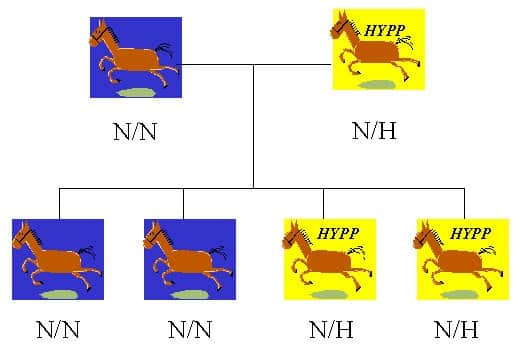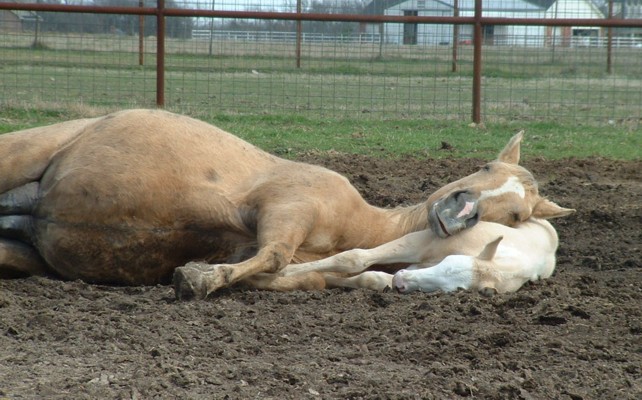
Good bacteria – bad bacteria
There are a lot of products out there that are said to influence the health of the horse’s intestinal tract. Many (most?) are said to do so by somehow affecting the bacteria that normally live in the horse’s intestinal tract. The bacteria that normally live in the horse’s gut, of course, are very important for the horse, and they are main reason that horses thrive on diets that we would starve on, and the main reason why giving horses supplemental vitamins are a pretty much a complete waste of time (CLICK HERE). But a question that I get a lot is whether these products – the most popular of which as called probiotics – are important for the health of the horse (and foal), or whether they are just another attempt to get into the horse owner’s wallet. Let’s look into the question, because it’s a question that isn’t simple to answer.
The original observation that certain bacteria were beneficial for health of the intestinal tract was first introduced by a really smart Russian scientist named Ilya Mechnikoff (who won the Nobel prize in 1908, but not for his work on microbes). At the start of the 20th century, Metchnikoff suggested that it might be possible to replace “bad” microbes with “good” microbes in the gut, and thereby promote the health of the intestinal tract. And, people have been trying to do pretty much just that ever since.
It wasn’t until about five decades later that he term “probiotic” was introduced, by a German bacteriologist named Werner Kollath. In 1953, Kollath wrote about probiotics as being pretty much the opposite of antibiotics, and defined them as being, “Active substances that are essential for a healthy development of life” Now that’s all well and good, but trying to figure out exactly what just what that means has been a challenge that is bedeviling scientists to this day.
Probiotics have been advertised to help a variety of conditions in human medicine, and they’re pretty heavily promoted for the treatment of conditions of the horse’s intestinal tract, too (e.g., diarrhea). In human medicine, they’re big business, too; the human probiotic market is worth well over 30 billion dollars annually worldwide. And they’re also promoted as sort of an overall “good thing” to put into the horse’s intestinal tract, even though, as we’ll see, there’s really not a whole lot to back that belief up.
 The horse’s body is home to trillions of microbes, countless bacteria, viruses, and fungi. In fact, there are at least 10 times more microbes in the horse’s body than there are cells in the horse. All of these microbes make up what’s known as the microbiome. There is absolutely not doubt that the microbiome is crucial to the horse’s health: it’s important for immune system health and for protection from many diseases, in addition to other important functions. The microbiome is the most metabolically active place in the horse’s body: more than the heart, muscle, skin, kidneys, whatever. The big question, however, is whether by giving a probiotic we can do anything significant to it, or about it.
The horse’s body is home to trillions of microbes, countless bacteria, viruses, and fungi. In fact, there are at least 10 times more microbes in the horse’s body than there are cells in the horse. All of these microbes make up what’s known as the microbiome. There is absolutely not doubt that the microbiome is crucial to the horse’s health: it’s important for immune system health and for protection from many diseases, in addition to other important functions. The microbiome is the most metabolically active place in the horse’s body: more than the heart, muscle, skin, kidneys, whatever. The big question, however, is whether by giving a probiotic we can do anything significant to it, or about it.
 In their most simplistic form, probiotics get to be thought of as “good bacteria,” as opposed, of course, to the “bad bacteria” that everyone hates. Good is good – bad is bad. Simple, right? The problem is that no one really has a good enough idea of what is happening with the bacteria of the normal equine gastrointestinal tract to say with any authority what might happen if you go adding some bacteria (assuming you are adding bacteria – more on that in a bit). Nevertheless, that fact hasn’t really stopped anyone from promoting the idea that if “bad” things are happening in the horse’s gut, one possible solution is to put “good” things in there to replace them.
In their most simplistic form, probiotics get to be thought of as “good bacteria,” as opposed, of course, to the “bad bacteria” that everyone hates. Good is good – bad is bad. Simple, right? The problem is that no one really has a good enough idea of what is happening with the bacteria of the normal equine gastrointestinal tract to say with any authority what might happen if you go adding some bacteria (assuming you are adding bacteria – more on that in a bit). Nevertheless, that fact hasn’t really stopped anyone from promoting the idea that if “bad” things are happening in the horse’s gut, one possible solution is to put “good” things in there to replace them.
ASIDE: I really wish that medicine were that simple.
PROBLEM ONE – Probiotics are generally made up of only a few different bacteria. The packaging between various products is different, of course, but the products are all made up of the same 5 – 10 strains of bacteria. And it’s not like they’re some specially proven strain of bacteria. The strains are mostly chosen for how easy they are to culture, not whether they are the bacteria best suited to thrive in the horse’s gut.
Probiotic products are generally given to the horse orally, mostly in powders or pastes. Of course, there are other ways to try to get bacteria into a horse’s gut, and so people have also proclaimed the virtues of things like yogurt, or sour buttermilk, or even the liquid from fresh intestinal contents from a dead horse (I am not making this up). But in spite of all of the noise and promotions, spite of the myriad health claims made on product packaging and in magazine ads, the products are not approved for the treatment of any disease or condition in any species, including people (where they’ve been most heavily studied). In horses, well, giving probiotics is kind of a big crap shoot (pun intended).
PROBLEM TWO – There are tens of trillions of bacteria inside the horse’s gut. These products, assuming they do have bacteria, have hundreds of times less. Probiotics are laboratory-raised bacteria; giving a horse a lab-raised probiotic is like releasing a few zoo-raised zebra out onto the Serengeti and hoping that they’ll mix right in with the herd and survive: even take control. However, there’s absolutely no evidence that the bacteria that people give to horses actually colonize the horse’s gut (as people seem to assume).
 Human studies on probiotics are really quite mixed in their results. There are some studies that sometimes show some benefits, but others don’t find any benefit at all. But even when studies conclude that probiotics are effective they often call for more research to find out which bacteria are the best, and what dosages are optimal.
Human studies on probiotics are really quite mixed in their results. There are some studies that sometimes show some benefits, but others don’t find any benefit at all. But even when studies conclude that probiotics are effective they often call for more research to find out which bacteria are the best, and what dosages are optimal.
OH, BY THE WAY – About a decade ago, the European Union looked at the claims made for probiotic products and said they aren’t supported by good evidence. In fact, since then, in the EU, the word “probiotic” has been banned because it is an unfounded health claim.
Happily, probiotic products appear to be pretty safe, even though no one has really done long-term studies to see what happens to people or animals that take such products for some time. And, remember, they still aren’t approved for the treatment or prevention of, well, anything.
 But here’s the thing. You can’t look at the human studies and say, “Well then, it must also work in horses.” That’s because the horse’s digestive tract is very different from that of a human. It’s apples and oranges. So, while human studies can add a bit of support to the concept that probiotics are good for humans, you can’t really extrapolate that information to the horse and say that they are also good for horses.
But here’s the thing. You can’t look at the human studies and say, “Well then, it must also work in horses.” That’s because the horse’s digestive tract is very different from that of a human. It’s apples and oranges. So, while human studies can add a bit of support to the concept that probiotics are good for humans, you can’t really extrapolate that information to the horse and say that they are also good for horses.
ANOTHER ASIDE: Just exactly when did the horse’s body start needing so much “help?” I mean, they’ve lived very happily with their own bacteria since before the beginning of recorded time. I mean, geez, the things that horses are said to “need” – probiotics, joint supplements, every six month teeth floating, precise “ration balancing,” etc., etc. – make you wonder how horses ever made it this long. And, at the rate things that they “need” are accumulating, it probably won’t be long until they fall apart altogether.
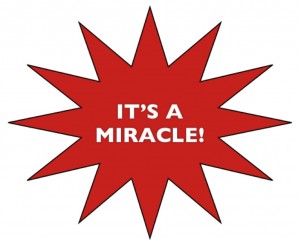 ONE LAST ASIDE: What about “prebiotics?” Prebiotics are defined as, “A non digestible food ingredient that promotes the growth of beneficial microorganisms in the intestines.” Again, it’s a great sounding idea, but, again, it’s not one that’s really been studied much. In fact, the whole concept is pretty implausible, since nobody has ever been able pick a product that promotes only the growth of the bacteria that you want to grow. That would be the same concept as a miracle potting soil that doesn’t have any chemicals in it that would only promote the growth of flowers, but wouldn’t be also a great thing for the weeds. Life just doesn’t happen that way.
ONE LAST ASIDE: What about “prebiotics?” Prebiotics are defined as, “A non digestible food ingredient that promotes the growth of beneficial microorganisms in the intestines.” Again, it’s a great sounding idea, but, again, it’s not one that’s really been studied much. In fact, the whole concept is pretty implausible, since nobody has ever been able pick a product that promotes only the growth of the bacteria that you want to grow. That would be the same concept as a miracle potting soil that doesn’t have any chemicals in it that would only promote the growth of flowers, but wouldn’t be also a great thing for the weeds. Life just doesn’t happen that way.
Now all that introductory stuff is all well and good, but, of course, the question that you’re interested in is, “Do these products do any good in horses?” And here’s where the waters get even muddier.
First of all, I have this crazy idea that for probiotic bacteria to do any good, there should be probiotic bacteria in your horse’s probiotics. And, as it turns out, there probably aren’t, or, when there are, they aren’t what the products say that they are. In 2011, in a study published in the Canadian Veterinary Journal, investigators found that when 25 probiotic products were assessed for label content and accuracy, most didn’t make the grade. In fact, “Only 4/15 (27%) products that had specific claims of viable organisms met or exceeded their label claim. Only 2 of these also had an acceptable label, which properly described the contents.” You can CLICK HERE to see the whole study.
So, if you ignore that little hurdle, you can then look for research as to whether the products do any good. And here, too, you find results that you might not expect, given how wonderful some people say that probiotics are. For example, giving a probiotic product to neonatal foals actually caused foals to develop diarrhea, and other clinical abnormalities. (CLICK HERE to see the study). In adult horses, probiotics appeared to just pass right on through (CLICK HERE to see the study), and they didn’t help horses with antibiotic-induced diarrhea (CLICK HERE) and they didn’t help horses digest carbohydrates (CLICK HERE), and they didn’t help horses after colic surgery, either (CLICK HERE)..
 In principle, it should be possible to come up with bacteria and systems to deliver bacteria that ARE beneficial to horses. That’s why a procedure called fecal transfaunation has some interest, where strained fecal contents are give to the horse via a nasogastric tube; at least you’re giving a whole bunch of different horse gut bacteria that way. But probiotics are “one size fits all” products. You can’t change the horse’s microbiome by just getting him to swallow a single product of a relatively small number of bacteria. It’s more complicated than that.
In principle, it should be possible to come up with bacteria and systems to deliver bacteria that ARE beneficial to horses. That’s why a procedure called fecal transfaunation has some interest, where strained fecal contents are give to the horse via a nasogastric tube; at least you’re giving a whole bunch of different horse gut bacteria that way. But probiotics are “one size fits all” products. You can’t change the horse’s microbiome by just getting him to swallow a single product of a relatively small number of bacteria. It’s more complicated than that.
Still, this is an area that’s an active area of research. One can imagine that in the future the individual microbiome will be examined, to look for gaps. Then, doctors will have to figure out which bacteria fill the gaps. Then, they’ll have to figure out the best way to deliver them so that they will take hold in an individual horse’s body.
PROBLEM THREE – We’re not there yet.
So, when it comes to probiotics, here’s my thinking. I don’t think that you’re likely to hurt your horse or foal if you give him a probiotic supplement. It’s just that I don’t think that you’re likely to help. Studies that have looked at these products find that they tend not to contain what they say they contain, they tend not to be manufactured under any quality control standards, they don’t have very many bacteria relative to the numbers of bacteria that are normally in the horse, and they tend not to work. If you’re bound and determined to try to dump some bacteria into your horse’s intestinal tract, I think you’d probably do just as well – and save money – if you spooned some yogurt or cultured buttermilk into your horse. In reality, at this point, nobody has much of an idea what’s happening anyway.
Maybe someday probiotics will be a big deal in horses. But not yet. Not yet.

